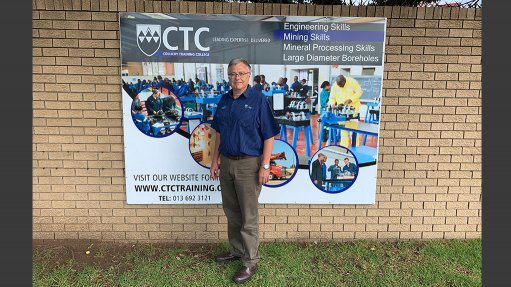
JOHAN VENTER The programme hopes to offer digital workplace skills that are applicable and beneficial to any trained artisan
Artisan and mining skills training college Colliery Training College (CTC) will launch a modern training programme – Artisan 4.0 – in response to the Fourth Industrial Revolution (4IR). The launch of the programme is scheduled to coincide with the Electra Mining show in September.
CTC MD Johan Venter notes that orders for capital equipment, such as robots, smart sensors and network devices, have been placed and will be delivered over the next few months, adding that the CTC board has approved R3-million to invest in the hardware required to deliver the programme.
The programme is aimed at aligning artisan training with the requirements of 4IR. It will consist of four phases of training, with the first phase being free of charge and online and covering all the essentials that an artisan requires to interact with the next phase of the material.
Phase 2 material will also be available online at a “relatively modest fee”, and will cover all the essentials for a digital workplace, such as smart devices, networks, robotics and advanced programmable logic controller training, which are not typically covered in the artisan curricula.
Phase 3 comprises a two-week course at CTC to enable practical experience on the above mentioned technologies.
Phase 4 will feature a work-based assignment in which learners demonstrate their capabilities with clearly defined outcomes.
Venter states that CTC knows that the skills currently taught to artisans are “out of step” with the skills required in a digital workplace.
“Artisan 4.0 aims to future-proof the skills set of artisans because without these digital skills they will fade into irrelevance. The programme hopes to offer digital workplace skills that are appropriate, applicable and beneficial to any trained artisan.”
Venter points out that this programme is for qualified artisans and persons training to become artisans and that no criteria have to be met to be accepted into the programme.
Meanwhile, Venter notes that, while several mining operations have been deemed ‘essential services’ during the Covid-19 lockdown and are, therefore continuing with operations, tertiary training providers are not included. Consequently, public and private colleges have been declared closed by Higher Education Minister Blade Nzimande.
“With the announcement of the lockdown, Artisan 4.0 was fast-tracked, and several CTC trainers attended an online crash course on online course development. In a few weeks, an increasing number of CTC courses will be posted online on its Moodle platform. Guest access is available at www.ctc.emhost.org for anyone wishing to experience a preview of what we are doing.”
Venter notes that CTC can still assist customers remotely as the company started developing the ability – prior to lockdown – to deliver online training.
The college offers mining-specific courses that include blasting and mineral processing, as well as surface and underground mining.
It is also accredited by the Mining Qualifications Authority (MQA) and the Quality Council for Trades and Occupations. A memorandum of understanding exists between CTC and relevant sector education and training authorities.
CTC mining and mineral processing training manager Jaco Strydom explains that the mining courses run continuously for eight to 12 months, during which learners physically attend classes in seven-week phases, ensuring that there is a continuous flow of learners at various stages of training.
“We have about 55 learners attending training on surface excavations and about 75 learners attending underground training at any time.”
Further, 95% of those who enrol for the blasting-qualification courses are employer-sponsored learners.
However, Strydom notes that despite self-funded learners being the minority, they have a greater demand for skills programmes as it places them in a “good position” when applying for entry-level employment positions at mines.
Upon completion, the Artisan 4.0 programme learners will receive a statement of results, as well as a certificate of competency issued by the MQA. Learners also sit the Department of Mineral Resources and Energy (DMRE) board exam to obtain their DMRE certificate to enable them to practise as miners or blasters.